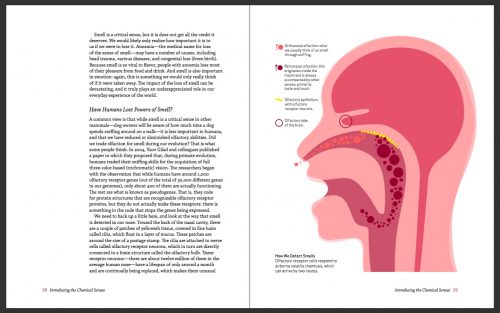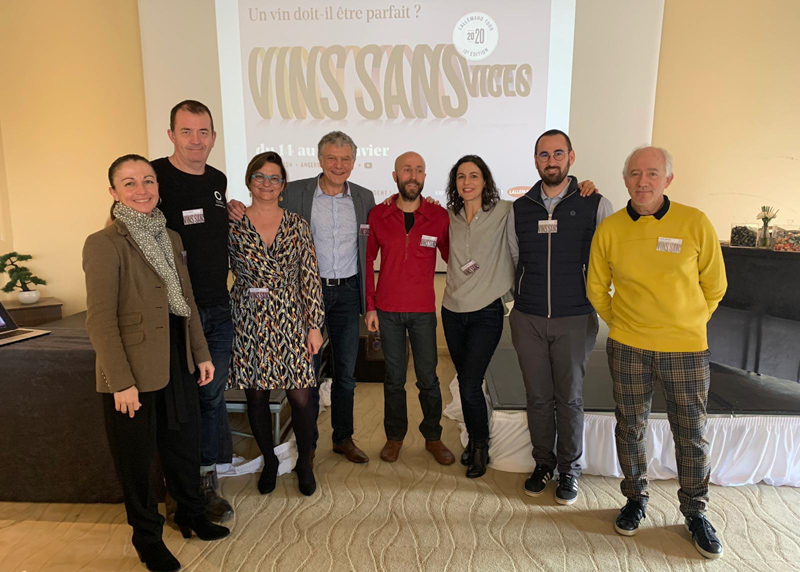
Do we have only very limited access to the sensory information that we are receiving all the time? As a wine taster, I’m particularly intrigued that my senses are capable of detecting a lot more in wine than my conscious perceptions are alerting me to. Here’s a case study that does seem to suggest this.
In The Man Who Mistook His Wife for a Hat (1985), neurologist and author Oliver Sacks recounts the true story of Stephen D., a twenty-two-year-old medical student who had experimented with psychoactive drugs. [It turns out that this was actually an autobiographical experience, which makes it all the more intriguing.]
In a vivid dream, Stephen saw himself as a dog. He entered a world unimaginably rich and significant in smells. When he awoke he had experienced an incredible transformation. Not only could he see enhanced colors (“I could distinguish dozens of browns, where I had just seen brown before”), but also he had a dramatic enhancement in smell.
“I went into a scent shop. I had never had much of a nose for smell before, but now I distinguished each one instantly—and I found each one unique, evocative, a whole new world.” Stephen found he could tell his friends apart just by their smell, and his patients, too. “I went into the clinic, I sniffed like a dog, and in that sniff recognized, before seeing them, the twenty patients who were there—each had his own olfactory physiognomy, a smell face, far more vivid and evocative, more redolent than any sight face.”
This ability lasted only for some three weeks. Sacks reported that sixteen years later it had not returned, and that Stephen was occasionally nostalgic for the loss of this enhanced smell world.
is remarkable account raises some interesting questions. Do our brains deliberately limit the extent of our olfactory perceptions? The case of Stephen suggests that our sense of smell is potentially much more powerful than the version we experience. We tend to underestimate our olfactory abilities because we make the wrong comparisons. We often compare ourselves with dogs, who clearly are able to inhabit a world that is quite different to ours in terms of using smell to sniff the environment. For a while, Stephen experienced this dog-like sense of smell—a world that is closed to us. His case suggests that the brain might in some way be limiting our smell worlds, somewhere between the olfactory epithelium and where the conscious experience of smell is perceived. Lurking within us is a potentially much more powerful sense that has been downgraded through evolution, simply because it serves us no useful purpose.
There’s an intriguing thought here. For some reason, the particular psychoactive that Stephen used allowed him access to this raw information. It would be very interesting to see whether this is generalizable, and whether some chemical help could open up an enhanced olfactory world, elevating what many now consider to be a base sense to a higher one.
Given this extra dimension of smell, how would wine seem to us? Would it be a much more intriguing and richer experience? Or would we have to learn all over again about the different types of wines? Would we be potentially much more useful as tasters and critics? Would we suddenly pick up vineyard signatures much more clearly? It would be a fascinating experiment.
5 Comments on Could we smell better? Much better?

Amazing story, with wine though there could also be a downside. The ability to pick-out infinitesimal amounts of TCA, geosmin etc could possibly make all wine faulty. Not likely I know, just a thought.
Fascinating! Stinky stuff like VA and acetaldehyde are there but in tiny amounts and masked by dominant aromas. I think we can smell those molecules when TCA disrupts our olfaction.
It’s a very interesting thought, but judging by my entirely anecdotal observations of dogs I’d say it’d be equally likely that it would make us dislike wine altogether as the smell of alcohol would be strong and painful to us.
I can’t wait to chat about this the next time we catch up!
As so-called supertasters might not be the best critics for ‘normal’ tasters, I suppose this kind of supernatural smelling would be of use in a laboratorium only. About the dogs: I don’t think dogs smell everything all the time in a extremely sensitive way. They smell their friends from an amazing distance, the rabbits they like to chase and the drugs and other specific scents they are trained to find. All the unimportant rest is neglected by their brains, just like our brains don’t register things we don’t need. In case you envy the dogs talent: they probably taste close to nothing. Thanks to our evolved retronasal smelling and tasting, a tasteful life is a human privilege, so I learned from the book Neurogastronomy by Gordon M. Shepherd. Did Oliver Sacks say anything about enhanced taste after his psychoactive trip?